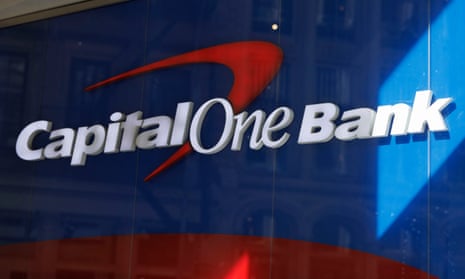Regulators have been urged to block Capital One’s $35bn takeover of Discover by campaigners who say the blockbuster deal is “dangerous, illegal, and must be stopped”.
Urging the Federal Reserve and Department of Justice to intervene, a coalition of more than a dozen advocacy groups cautioned that combining two of the largest credit card companies in the US would damage competition and “further concentrate risk” in the financial system.
In a letter seen by the Guardian, the organizations warned that Capital One would be able to hike fees after closing the acquisition, announced by the companies last month.
“The scale and scope of harms represented by this transaction are enormous,” they wrote. “The threat is grave, not just to the dynamism of the economy and the stability and competitiveness of the financial services sector, but to American businesses and the health of consumers across the country.”
Signatories included the American Economic Liberties Project, Public Citizen and Americans for Financial Reform.
In a statement, a Capital One spokesman said it had a “long history” of serving consumers and businesses with “best-in-class” products and services. “As this process moves forward, we are fully committed to engaging with consumer organizations and other stakeholders to demonstrate the significant benefits of this transaction to consumers, communities, and competition in the marketplace.”
But Jesse Van Tol, president and CEO of National Community Reinvestment Coalition, another signatory to the letter, said: “Capital One is a notorious bad actor, even at its current size, and should not be allowed to further concentrate market power.”
Capital One is one America’s biggest banks, and a key issuer of Visa and MasterCard credit cards in the US. Discover, with 305m global cardholders, is one of the largest card payment networks in the US, although it is behind those of Mastercard, Visa and American Express.
The takeover, Capital One has argued, would enable it to “build a payments network that can compete” with the market’s largest players. Some Wall Street analysts have questioned whether Visa or Mastercard would suffer much as a result of the deal.
“Every prong” of the bank merger review framework considered by regulators indicates they should “deny this merger”, the advocacy groups argued in a letter to Jerome Powell, the Fed chair; Martin Gruenberg, chair of the Federal Deposit Insurance Corp; Michael Hsu, acting comptroller of the currency; and Jonathan Kanter, assistant attorney general at the Department of Justice. “If bank regulators do not reject this merger, we urge the justice department to sue to block the deal.”
after newsletter promotion
Capital One expects to close the deal by late 2024 or early 2025, subject to regulatory and shareholder approvals. The payments space – particularly Visa and Mastercard – has faced heightened scrutiny in Washington in recent years, and the Biden administration has adopted an aggressive stance on antitrust issues.
The Fed declined to comment.
